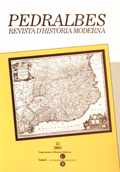La percepción en la historia y las relaciones internacionales en la Época Moderna
Keywords:
Intemiitional relations, foreign policy, perception, images, decision-making, actions, mentalities, ideas, thought, psychology.Abstract
This article is about the human perception of reality, the mental images produced by it, its role in international relations, and, to a certain extent, in politics in general. It tries to emphasize the importance of the investigation of images, which contemporaries of different times held about their world. The objective is to become able to understand, explain and also appraise the thoughts, ideas and actions of other ages and the results of these, to be finally able to write history. It is the intention of this article to raise the question why it is important, also or especially for historians of the Early Modern times, to inquire irito the perceptions of those who were decision-makers, and to see what benefits this could hate. Likewise, there are treated the different aspects of perception which are interesting to our investigation First, the problem is raised from a theoretical and methodological point of view. In the second part of the article, the area of the investigation of perceptions and mental images is limited through a sl-~ort exposition of its evolution and an outline of published writings.
Downloads
Published
How to Cite
Issue
Section
License
Copyright (c) 2002 Ib Mark Schumacher

This work is licensed under a Creative Commons Attribution-ShareAlike 4.0 International License.
Authors must agree with the following terms:
1. The author keeps authorship rights, ceding the journal the right to first publication.
2. Texts will be disseminated with a Creative Commons Attribution 4.0 International License. Which allows for the work to be shared with third parties, as long as they recognise the work’s authorship, the original publication in the journal and licensing conditions.
This requires acknowledging authorship appropriately, providing a link to the license, and indicating if any changes have been made. It can be indicated in any reasonable way, but not in a manner that suggests the licensor endorses or sponsors the use of the text.
If content is remixed, transformed, or new content is created from the journal's texts, it must be distributed under the same license as the original text



